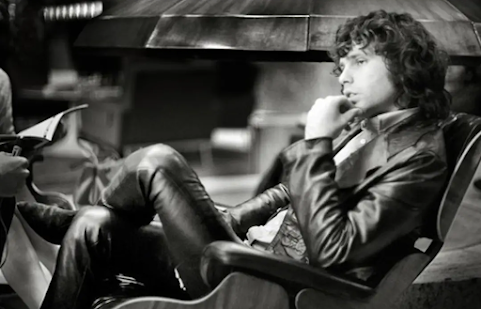THE DOORS' "WHISKEY, MYSTICS AND MEN": A PRECIOUS OUTTAKE FROM 1969
Jim Morrison's fascination with poetry, evident in the music recorded by
The Doors since 1965, intensified further from autumn 1968 onwards.
During this period, artistic disagreements with the other band members led
the frontman to devote more of his energy to writing poetry than to composing
songs.
Consequently, on February 9, 1969, Morrison recorded a series of intense
poems he had previously written and intended for future, still undefined, projects.
The resulting tape also features a rhythmic chant whose poetic form in
rhyming couplets flows over the upper range of the singer's voice.
This is 'Whiskey, Mystics And Men' (link here),
in which the oscillating inflection outlined by Morrison's singing conveys a subtle, flowing, and slightly nostalgic expressiveness.
This moving performance lasts just two minutes and is guided by lyrics
that are not entirely straightforward. However, themes such as the need to
enjoy a more authentic and natural approach to reality, as opposed to the
manipulations devised by rationality and modernity, can be recognized.
Furthermore, the final verse explicitly encourages listeners to find a
new answer to life's questions, emphasizing the importance of the inner sphere
as a counterbalance to the prevalent consumerism: 'We must try to find a new
answer instead of a way'.
As was often the case with Morrison, the vocal line traced by the singer
in this short poem intertwines with a musically compelling melody,
foreshadowing the potential of a full song.
At that time (February 1969), The Doors were busy putting together the track
list for the LP that was due to be released in some months ("The Soft
Parade," released after grueling recording sessions in July '69).
Among the possible tracks, "Whiskey, Mystics And Men" was also
considered.
So, starting from Morrison's poem, two different arrangements were
developed in late winter 1969.
Both versions were worthy of inclusion on the album once recorded. However,
they remained criminally unused, thus becoming precious outtakes for posterity.
One of the two recordings (link here) reflects
the new sounds (horns, strings and other unusual instruments) devised for many of the
arrangements on "The Soft Parade" LP.
In this case, we find Jesse McReynolds on mandolin (also featured in
'Runnin' Blue'), a jug player, Robby Krieger on acoustic guitar (played with
the slide technique), Ray Manzarek on keyboards, John Densmore on drums, and
Jim Morrison on vocals.
The original rhythm of the verses is slowed down, bringing poetry into
the deeply evocative realm of a traditional maritime work song (called “sea shanty”)
that we might have heard on a sailing ship in the 19th century during strenuous
maneuvers or in a tavern frequented by sailors.
The tune’s swaying cadence is marked by three distinct elements.
Firstly, there is the dark, rounded sound produced by blowing on the rim
of the 'jug' (a handmade instrument typical of 1920s and ‘30s Jug Band Music,
where it replaced the double bass or tuba).
Secondly, there is the bass drum played by Densmore together with short,
decorative snare drums interludes.
Lastly, the small keyboard that imitates the frequencies of the electric
bass, called Fender Rhodes piano bass. Manzarek plays it with his left hand,
achieving a similar result to that obtained almost three years earlier in
'Alabama Song'.
This marked rhythm, reminiscent of a ship rocking on the waves or beer
mugs following the melody of the song, is embellished by the bright and colorful
acoustic interplay of the guitar and mandolin.
The tune is further adorned by an unusual type of electric keyboard: the
mellotron (introduced to psychedelic pop-rock between 1966 and 1967, then becoming
common in the Progressive Rock genre by 1969).
The fluid and ethereal lines painted by this instrument in this version
of “Whiskey Mystics And Men” are fascinating to say the least. A theme with a
sadly refined and elegantly thoughtful atmosphere, reminiscent of the simple
motifs released with calculated cheerfulness by 19th-century fairground organs.
The music just described fits the structure of this traditional work
song perfectly: a call (the words recited with melancholic austerity by Morrison)
receives an answer (the "ta-da-daaa" sung by both Morrison and other
participants in the session).
A second version of "Whiskey, Mystics And Men" (link here), also dates from February '69. It differs from the previous one in the irregular waltz rhythm devised by the drums, a diverse vocal approach, and a more incisive arrangement (drums, Hammond C3 organ, Mellotron, electric bass, and vocals).
Notably, the excellent session musician and electric bassist Harvey
Brooks dominates the song with the low, pervasive and robust notes, whose contours
are simultaneously rough and nuanced.
Morrison's intonation becomes aggressive, at times angry, charged with a
biting determination and an impetuous urgency.
This more rock-oriented transposition of the original poem is completed
by a vaguely blues-tinged solo by Krieger, whose opening idea would be
revisited in 'Land Ho' during the recording of the LP 'Morrison Hotel'.
Having found no place among the tracks on "The Soft Parade" or
even on the following album ("Morrison Hotel", released in February
1970), "Whiskey, Mystics And Men" was finally returned by its author
to the realm of pure poetry. In fact, on December 8, 1970, Morrison recorded a
new series of poems in the studio, including this composition.
It is an epilogue full of circular sarcasm, that goes back to the
artistic starting point from which these verses originated in February 1969. This
ending does not do justice to an underrated song that is extremely significant from
both historical and musical perspectives.
My book "The Doors Through Strange Days"- The most comprehensive journey ever made through The Doors' second LP, is available on Amazon.com, .uk, .it, .mx, .ca, etc.
Here’s a link:




Comments
Post a Comment